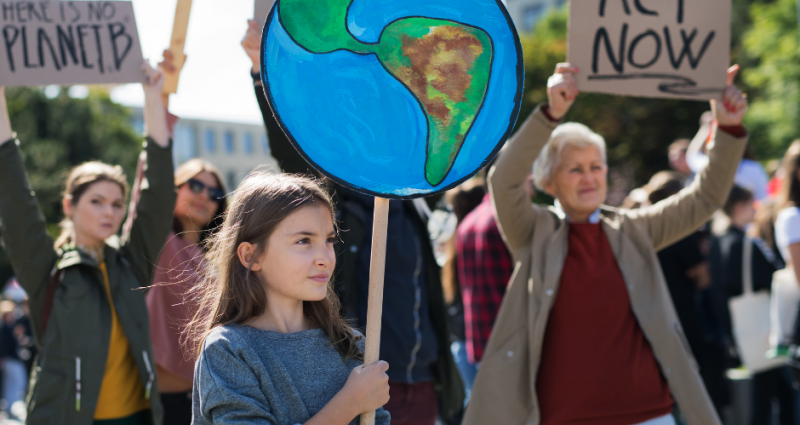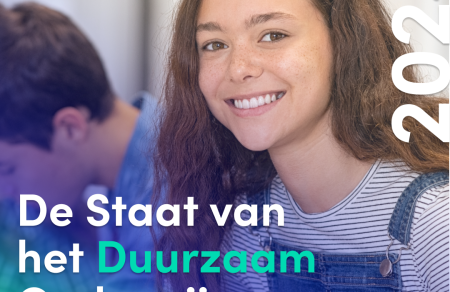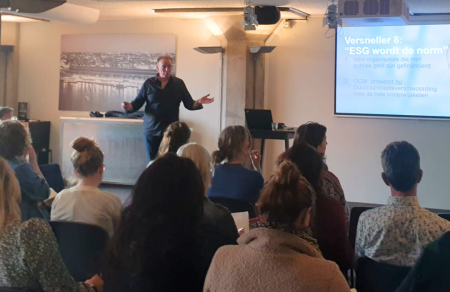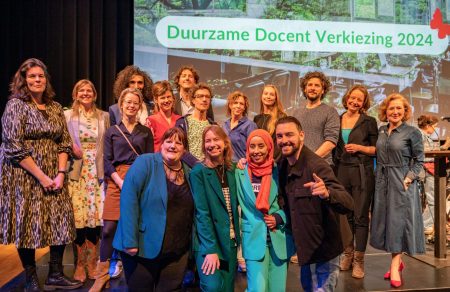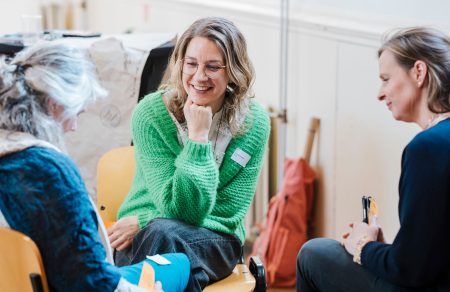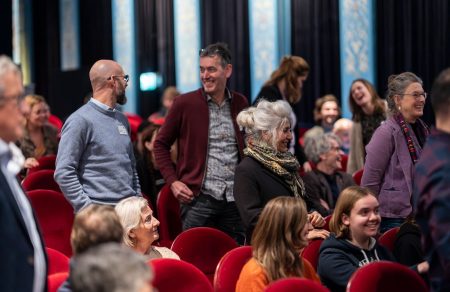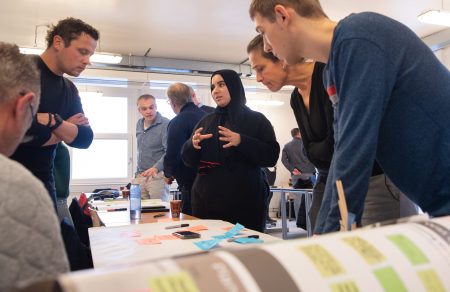The agreement recognizes that climate change is the greatest challenge facing our generation, with a promise to make the Netherlands climate-neutral, fossil-free and circular; commit to climate targets; strengthen biodiversity; and ensure that everyone can contribute to a sustainable world in which the polluter pays.
Despite the positive perspective and the commitment and concretization of the climate issue, when it comes to sustainable education and its important place in the transition to a circular world, we are left with a number of unanswered questions about this agreement. In this article, we take you through the main points of the coalition agreement for sustainable education.
Key points for sustainable education in a row
A climate minister - There will be a Minister for Climate and Energy who will direct the policy and the climate fund, with an independent scientific advisory board to advise and assess the policy. Citizens will also be actively involved in the implementation of this policy, including by introducing a generation test. This gives the climate issue and the circular transition more dedicated attention. However, a shift in ministries also means a shift in responsibilities per portfolio, where it is important to ensure integrality between subjects and to ensure a good transition in transfers. To what extent and how this will be done is not yet clear.
More customization - There will also be more room for "customized diplomas" (p.20), which means more focus on the different needs of students. Social service time (MDT), which is being expanded, is part of this. MDT involves young people between the ages of 14 and 27 volunteering to help others. We see this as an opportunity for students to become aware of the challenges in society and of their own ability to contribute to a solution. MDT can be accomplished in social projects in the areas of care, welfare, safety, sport, nature and climate.
Direct investments - The agreement states that schools will be put in a position by "allowing investments to go directly to the classroom as much as possible, according to the system of workload resources. According to this coalition agreement, schools must be more accountable for the use and effectiveness of the resources, without increasing the administrative burden. In doing so, 'the control of school leaders and teachers as well as the involvement and participation of parents and pupils' (p.19) will be increased.
More control is good news for sustainable education, because it is the inspired teachers who have been making their students aware of (the importance and content of) sustainable development for decades. To do this, however, teachers need the space (time and money). We hope that the legitimization of that commitment of resources (by schools and teachers) follows from the new learning objectives for po and vo. These have not been adapted for a generation now, and we also expect that the new learning goals will pay much attention to sustainability. After all, the major transitions of our time largely determine the future of students.
Improve educational quality - The agreement places great emphasis on improving the quality of education, for which 1 billion per year is budgeted. Citizenship is an integral part of this. What citizenship exactly means, however, is not defined in the agreement. By means of a so-called Masterplan, the coalition aims to strengthen the quality of education by means of (financial) management of visible improvements in the field of educational quality in general and basic skills in particular. It also focuses on "strengthening the quality of teacher education" (p.20), by creating more attention to themes such as effective subject teaching, specialization in the young or older child, digital skills and appropriate education. Our question remains: How can you strengthen the quality of education and teacher training without looking at this from a future-proof and therefore sustainable perspective?
In the implementation of the master plan, we hope 'that sufficient attention will be paid to the major transitions in society (climate, circularity and inclusiveness) and an integrated approach to them in education. By this I mean according to the Whole School Approach (WSA), in which curriculum and didactics are linked to the training of teachers, the environment and the own management of schools, also and especially in basic education / po and vo' said Giuseppe van der Helm. It is also important that the Sustainable Development Goals become an integral part of education and teacher training, because these world goals determine the future of our children. And without education about them, it is not possible to realize these goals.
The transition to a circular world requires a changing role for teachers, about which there is not much described in the agreement although it is important for securing educational quality. If we place the student more centrally, this will require teachers to play a more coaching role, for example. Will this changing role - and what teachers and students need in it - be included in the elaboration of this master plan? In addition, to guarantee that sustainability is integrated into education and continuous development of the quality of education is guaranteed, it is also important that the Education Inspectorate monitors the implementation of the policy on sustainability, which is not the case at present. In short, it is good that there is a focus on improving the quality of education, but hopefully in the elaboration there will be enough attention for a sustainable and future-proof implementation .
Read more
Reducing the workload - The agreement states that it will also invest in reducing the workload. With this investment, schools can, for example, reduce class sizes or put more teachers and supervisors in front of the class. The new cabinet wants to facilitate digital tools in order to reduce the workload and simultaneously improve the quality of education. The question is: How can all these tasks to ensure quality be added and at the same time reduce the workload?
Sufficient professionals - The agreement also states that "having enough professionals is a prerequisite for an ambitious climate policy" (p.7). The coalition wants to examine with educational institutions how they can train and retrain professionals. In the plans about education, however, we see no concrete developments of this, leaving the question of how this will happen unanswered. Little attention is paid to the role of primary education in making pupils aware at an early age of the challenges on our planet and of their own contribution to solutions.
Equal Opportunities - Everyone in the Netherlands deserves a good life and should be able to participate. This starts with offering all children, young people and students the same opportunities to develop and grow. That is why the four coalition parties want to strengthen the quality of education "to get the basics right so that every child learns to read, write and count and is properly taught about citizenship" (p19). To achieve this, investments are made in good teachers and school leaders, which is included in the aforementioned master plan. We are curious to see how this will be worked out.
Zero unnecessary homeschoolers - 'We are reducing the number of unnecessary home-sitters to zero.' In 2020, around 2,400 students were sitting at home who thus also did not receive an educational offer. The new coalition wants to reduce this by: 'Giving every child a form of education, among other things by shaping a Digital School' (pg 20). What this Digital School looks like in practice is unclear.
Closing the salary gap po/vo - The coalition agreement offers perspective for school leaders by closing the salary gap between primary and secondary education, which is important for the appreciation of all these teachers who make a crucial contribution to the development of young people. They guarantee educational quality and continuity. Attracting and retaining good teachers is also important in the structural approach to inequality of opportunity, the further development and innovation of education and dealing with the current educational delays caused by Corona.
Return of basic grant for students - The biggest change for students is undoubtedly the return of the basic grant. 'We want everyone to be able to study, regardless of their parents' income. We will therefore introduce a basic grant for all students and an income-dependent supplementary grant as of the academic year 2023/2024.' (p21). Students who have made use of the loan system in the past period will receive a reduction on their study debt or a study voucher. According to the organizers of the petition "Not my fault", who fought for the end of the loan system, 1 billion is not enough. Therefore, they are organizing a compensation protest on February 5.
Despite the fact that many questions remain unanswered, the above points offer new opportunities. That sustainable education is not mentioned as such is a missed opportunity. Nevertheless, we see that the above points do provide room and perspective to give substance to the coalition plans from sustainable education and to fill in the unanswered "how" questions. It now comes down to the implementation of the coalition agreement.
Source: Coalition Agreement


